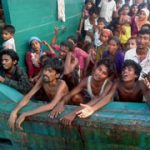I recently met with a Rohingya man in Burma, who was eager to board a boat and flee from Rakhine state. He had a young son, however, his first-born, and was worried that his child might not survive the trip to Malaysia in an open boat. Despite the possible dangers, he was debating risking his child’s safety and making the trek, as he had experienced first-hand the lack of rights and access to opportunities afforded to Rohingya in Rakhine state.
As of last week, an estimated 8,000 Rohingya refugees from Burma (officially the Union of Myanmar) and Bangladesh were adrift on ships in the Indian Ocean, according to the International Organization for Migration. These men, women, and children stranded at sea have risked their lives on overcrowded boats because the Burmese government has made the alternative – trying to survive state-sponsored persecution in Burma – increasingly impossible. While after some delay, several states have come forward to provide the migrants with assistance, any long-term progress will require that Burma fully address the root problem of persecution of the Rohingya.
Over a million Rohingya live in Rakhine state in western Burma. They have faced persecution from the Burmese government since the end of World War II, driven by nationalism, xenophobia, and the state’s divide-and-rule policies, which pit the Rohingya against the Buddhist majority. The government conducted major military campaigns against Rohingya in the late 1970s and mid-1990s, forcing hundreds of thousands to seek refuge in camps in Bangladesh. In 1982, the military dictator Ne Win passed a law that stripped Rohingya of citizenship and the protections that come with it – effectively making them stateless.
Rohingya have also been subjected to forced labor, forced relocations, restrictions on movement, restrictions on marriage and children, sexual violence, extortion, and arbitrary detention by the Burmese government. Taken together, these acts amount to crimes against humanity and have created the potential for genocide. In 2012, Burma’s president asked the UN High Commissioner for Refugees to resettle all Rohingya to third countries or move them to refugee camps; UNHCR rejected this request. The Burmese government refuses to even use the use the word "Rohingya," preferring instead to call the group “Bengali” in order to support their patently false claims that Rohingya are recent arrivals from Bangladesh.
Physicians for Human Rights (PHR) conducted investigations in Bangladesh and in Rakhine state in 2010 and 2013, respectively, and found that sexual violence, land confiscations, and other crimes against humanity had driven hundreds of thousands of Rohingya to Bangladesh – where the Bangladeshi government then obstructed the work of humanitarian organizations and limited access to food aid. Moreover, in the 2013 report, PHR documented that Burmese government forces were responsible for providing cover for Buddhist mobs that were attacking the Rohingya and burning their homes. PHR also found that shelter, water and sanitation, and medicine were woefully inadequate in camps for the internally-displaced in Rakhine state.
Taken together, these abuses have resulted in physical insecurity for the Rohingya and a lack of access to education, health care, housing, land, and work. It is these life-threatening conditions that are leading increasing numbers of Rohingya to flee the country by sea.
Rohingya in Bangladesh, Burma, Malaysia, Thailand, the United Kingdom, and the United States have told PHR that they are aware of the risks of kidnapping, trafficking, slavery, torture, and even death that come with boarding a migrant boat headed to another country. Some families in Burma, still in phone contact with relatives who have fled, have heard the horror stories, first-hand, that are now being reported by the international media. But because the oppression in Burma is worsening, many Rohingya feel that remaining in country is a far worse alternative.
Earlier this week, the Burmese government – with characteristic hypocrisy – denied responsibility for creating the current situation and threatened to boycott a meeting of regional governments to address the crisis if the word “Rohingya” is used. Burma’s government has been seeking international legitimacy since 2010, when a quasi-civilian government was installed. In order to gain such legitimacy, it must end the state-sponsored persecution of Rohingya in Rakhine state and start a meaningful regional dialogue on how to resolve short- and long-term problems.

